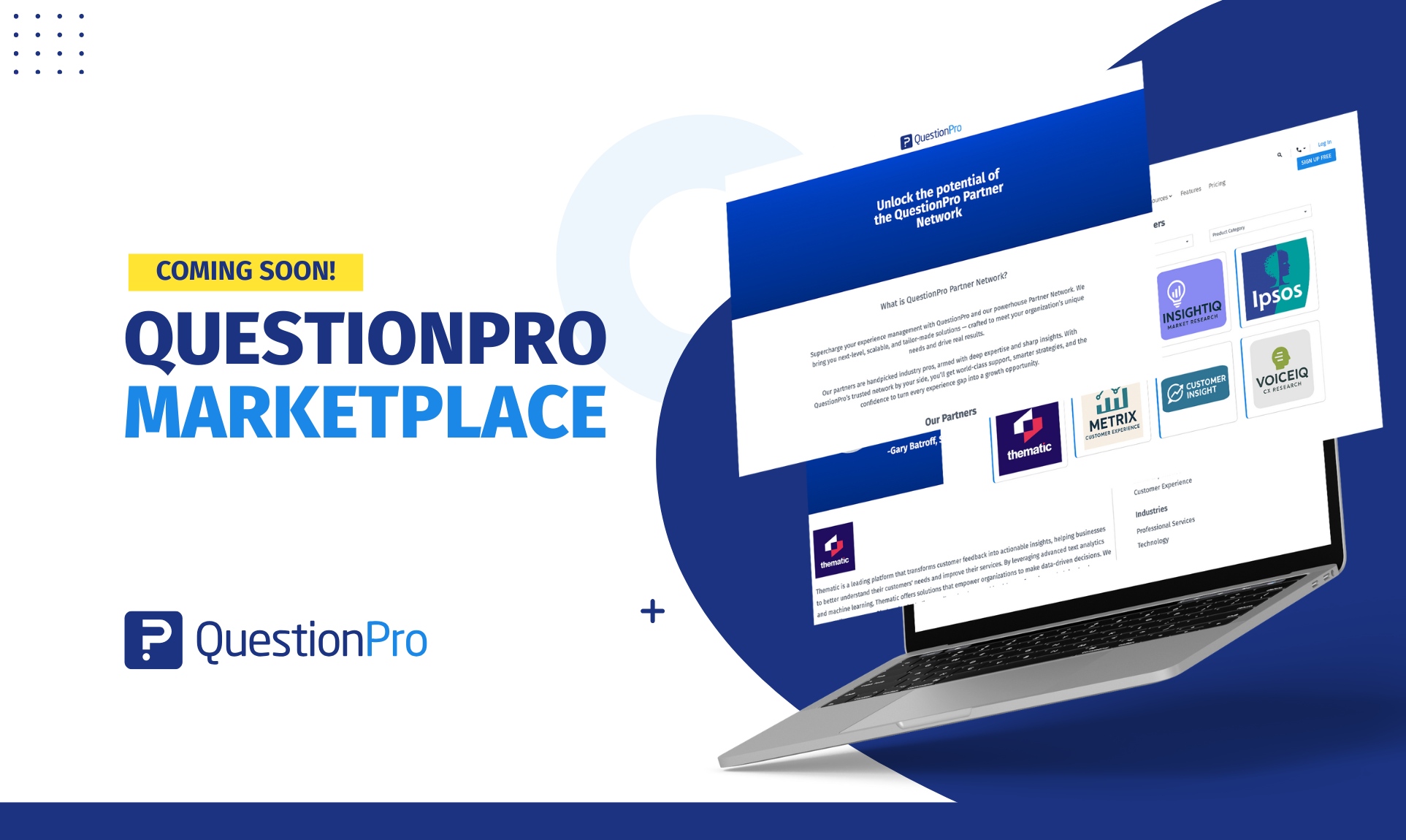
Technically, a survey is a method of gathering and compiling information from a group of people, more often known as the sample, to gain knowledge by organizations, businesses, or institutions. This information or opinion collected from the sample is more often a generalization of what a large population thinks.
Different types of surveys help provide important or critical information in the form of meaningful data, which is further used by businesses or organizations to make informed and sound decisions. The collected data offers good insights only when the administered questionnaire is carefully designed to promote response rates and includes both open-ended questions and closed-ended questions and answers options. There is much variety when it comes to surveys, and we can identify their types based on the frequency of their administration or the way of deployment.
Types of Survey
Now that we know what a survey is and why do we need to survey people, let’s explore its types. These can be classified in different ways, as mentioned earlier, depending upon the frequency of administration or deployment and how the distribution/deployment occurs. There are other types of surveys like random sample surveys (to understand public opinion or attitude) and self-selected type of studies.
LEARN ABOUT: Candidate Experience Survey
Types of surveys based on deployment methods:
1. Online surveys:
One of the most popular types is an online survey. With technology advancing many folds with each passing day, an online survey is becoming more popular. This survey consists of survey questions that can be easily deployed to the respondents online via email, or they can access the survey if they have an internet connection. These surveys are easy to design and simple to deploy. Respondents are given ample time and space to the respondent to answer these surveys, so researchers can expect unbiased responses. They are less expensive, and data can be collected and analyzed quickly.
LEARN ABOUT: Event Surveys
2. Paper surveys:
As the name suggests, this survey uses the traditional paper and pencil approach. Many would believe that paper surveys are a thing of the past. However, they are quite handy when it comes to field research and data collection. These surveys can go where computers, laptops or other handheld devices cannot go.
There is a flip side to it too. This survey type is the most expensive method of data collection. It includes deploying a large number of human resources, along with time and money.
LEARN ABOUT: course evaluation survey examples
3. Telephonic Surveys:
Researchers conduct these over telephones. Respondents need to answer questions related to the research topic by the researcher. These surveys are time-consuming and sometimes non-conclusive. The success of these depends on how many people answer the phone and want to invest their time answering questions over the telephone.
4. One-to-One interviews:
The one-to-one interview helps researchers gather information or data directly from a respondent. It’s a qualitative research method and depends on the knowledge and experience of a researcher to frame and ask relevant questions one after the other to collect meaningful insights from the interview. These interviews can last from 30 minutes up to a few hours.
Types of a survey based on the frequency of deployment
1. Cross-sectional studies
These surveys are administered to a small sample from a larger population within a small time frame. This type offers a researcher a quick summary or analysis of what respondents think at that given time. These surveys are short and ready to answer and can measure opinion in one particular situation.
Consider hypothetically, an organization conducts a study related to breast cancer in America, and they choose a sample to obtain cross-sectional data. This data indicated that breast cancer was most prevalent in women of African-American origin. The information is from one point in time. Now, if the researcher wants to dwell more in-depth into the research, he/she can deploy a longitudinal survey.
Learn more: Cross-sectional Study
2. Longitudinal surveys:
Longitudinal surveys are those surveys that help researchers to make an observation and collect data over an extended period. There are three main types of longitudinal studies: trend surveys, panel surveys, and cohort surveys.
Trend surveys are deployed by researchers to understand the shift or transformation in the thought process of respondents over some time. They use these surveys to understand how people’s inclination change with time.
Another longitudinal survey type is a panel survey. Researchers administer these surveys to the same set or group of people over the years. Panel surveys are expensive in nature, and researchers try to stick to their panel to gather unbiased opinions.
The third type of longitudinal survey is the cohort survey. In this type, categories of people that meet specific similar criteria and characteristics form the target audience. The same people don’t need to create a group. However, people forming a group should have certain similarities.
Learn more: Longitudinal Study
3. Retrospective survey:
A retrospective survey is a type of study in which respondents answer questions to report on events from the past. By deploying this kind of survey, researchers can gather data based on past experiences and beliefs of people. This way, unlike a longitudinal survey, they can save the cost and time required.
Learn more: Cross-sectional vs Longitudinal Study
Random public opinion/attitude type of survey research:
When an agency needs reliable, projectable data about the attitudes and opinions of its citizens or a select group of its citizens, it is essential to conduct a valid, random sample survey. Telephone interview surveys are considerably more common than in-person interviews because they are far less expensive to administer and act as a standard tool for gathering information.
There is a margin of error based on the sample size (generally, a minimum population sample of 200 is the industry standard for reliable data about any population segment). Overall, random sample telephone interview surveys provide reasonably accurate information about the population.
While there is a statistical margin of error (the sample of 200 provides an error range of +/- 7% with a 95% confidence), this type of survey is the most democratic and reliable process for learning about the opinions of an entire community.
A random sample survey is inappropriate for educating people about an issue or assessing what people will do at some future point (i.e., “Will you vote for this bond issue?”). But, the results provide a reasonably accurate portrait of the person’s opinions in the present moment (i.e., a person’s feelings or attitudes about the issues relating to the need to approve a bond). Questions in the past and present tense provide a reasonable degree of accuracy about a person’s usage and habit patterns.
If you are trying to calculate the ideal margin of error for your research, you can use tools like our margin of error calculator.
LEARN ABOUT: telephone survey
Self-selected type of survey research – Newspapers, mail, Internet, written questionnaires:
When an agency has a political need to create a survey process that allows anyone interested in responding, it can do a self-selected process. A written survey can be distributed in public locations, such as the City Hall or Library, emailed directly, emailed, or published in the city newsletter or the local newspaper.
When reporting data from a self-selected survey, it is essential, to begin with, the understanding and the language, “Of those who chose to respond…..” Most often, those who volunteer to respond to a self-selected survey have a strong opinion (frequently negative) about the issue in question.
A self-selected survey can be an excellent public relations tool and the right way to inform the public. But, it’s crucial to be cautious in drawing any conclusion about what the public, in general, thinks based on the results of a survey when the respondents are volunteers.
Learn more: Research Design
Types of surveys with examples
A researcher must have a proper medium to conduct research and collect meaningful information to make informed decisions. Also, it is essential to have a platform to create and deploy these various types of market research surveys.
LEARN ABOUT: Top 12 Tips to Create A Good Survey
QuestionPro is a platform that helps not only to create but also to deploy different types of surveys. We have 350+ types of survey templates and survey examples, including:
- Customer survey templates: Customers are crucial to success for any business or organization, and so are customer satisfaction surveys. It is essential for organizations or companies to understand their customers and what their needs and preferences are. Use the customer survey template to understand your customers better and work on their feedback to grow and flourish your business.
- Market research & Marketing survey templates: Use marketing survey templates for market research to determine what consumers think about products or services. These are also helpful for a brand to assess whether products are reasonably priced, gather feedback from consumers, measure their level of awareness, and more.
- Community survey templates: Community survey templates can be administered to members of associations or foundations to get feedback regarding the various activities conducted within the association. This helps understand the member’s experiences and collect feedback regarding what kind of programs add value, feedback of previously held events, etc. and more.
- Human Resource survey templates: The human resource survey template can be used by businesses and organizations for employee evaluation, employee satisfaction, employee engagement, and more. Organizations can send these out to employees, and their feedback can be collected and implemented.
LEARN ABOUT: Workforce Planning Model
- Industrial survey templates: Expertly designed survey templates that are customized for the different industries help to collect in-depth feedback or information from consumers of various industries like event management, hotel industry, fast food industry, transportation, just to name a few. Through these survey templates, the industry player can understand what good they are already doing and what needs more attention from a consumer’s point of view.
- Academic survey templates: Academic survey templates are one of the best ways to understand how students and their parents respond to the efforts taken by your education institution. A online questionnaire designed by industry experts helps to assess the parent/student feedback on a course evaluation, curriculum planning, training sessions, etc.
- Nonprofit survey templates: These Nonprofit survey templates are designed by domain experts to collect targeted information and feedback from various donors, volunteers, stakeholders, and any other participants of a nonprofit’s activities. The questionnaires address various important touchpoints and collect data from event attendees, collect donor survey feedback, or run an internal survey among volunteers.
LEARN ABOUT: Best time to send out surveys
One can choose from these existing survey format templates or create a survey of their own, all this just at the click of a button.
Explore: 350+ Free survey templates







